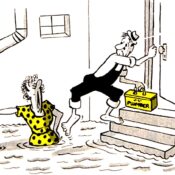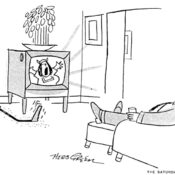I started feeling better when they trashed the elk.
In early July, vandals attempted to burn down a 120-year-old bronze statue of an elk in Portland, Oregon. On its fire-damaged base, they spray-painted obscenities and anarchist symbols. Authorities hauled the elk away before the mob could return and pull it down with ropes.
So, just “same old, same old” for summer 2020.
But seriously, I thought, an elk?
It was one thing when roving bands toppled Confederate statues: You might disagree with the acts or methods, but you could understand the point. Next on the chopping block were the nation’s founders and various historical figures — and still, observers could follow the bouncing ball.
But when they poured red paint over a bust of Miguel de Cervantes, the Spanish author who penned Don Quixote in 1605, I couldn’t figure it out. What had poor Miguel done except gaze mournfully out at Golden Gate Park in a frilled ruff? And which 17th century innovator of the novel would get whacked next? Daniel Defoe?
This sort of thing bothered me. It was a confusing, disorienting time.
But then they trashed the elk, and I realized they were simply morons. When revolutionaries attack a sculpture of a four-footed herbivore, it is not a political act but a Monty Python skit. It’s impossible to satirize, because you can’t top the absurdity of the real thing.
All of a sudden, I felt fine. The downcast, anxious, frightened national mood had jumped the shark.
Based on a 1977 episode of Happy Days, the phrase applies when something becomes so ridiculous that people abandon it, shaking their heads. Happy Days went downhill after Fonzie paired his leather jacket with water skis and jumped over a shark.
In 2020, it may be that unhappy days have jumped the shark. The nation has spent months if not years awash in miserabilism: a fancy word for negativity and gloom. Anarchists who’d smash an elk are the ultimate miserabilists: people so depressed and angry, they want downtown Portland to look as bad as they feel.
But most of us have felt less-than-cheery for a while. When I first heard the term miserabilism, it seemed to describe many Americans’ inner life, where things once considered fine were increasingly a source of guilt and disapproval.
There was a long list of things to feel bad about for one reason or another, including drinking straws, grocery bags, cars, air travel, graduation parties, playgrounds, routine medical procedures, restaurants, meat, gluten, dairy, getting a tan, football, politics, history, literature, comedy, and Mount Rushmore.
It’s hard to be both a miserabilist and a parent, however. Kids are spontaneous and funny; they feel guilty about very little. Spend enough time with them and their carefree attitude rubs off. Plus, parents are wired to transmit good things to their kids: language and culture, history and values, how to overcome problems, build a fulfilling life, and have fun.
“Everything is bad, so just stay indoors and feel bad” is not a message normal parents care to send, even in 2020.
Nor are parents impressed with random acts of destruction: We saw it all during the toddler years, and we invented the Time Out Corner to stop it. As some kind of public claim to moral superiority, it doesn’t work.
So when they trashed the elk, I thought: “That’s it. I’m out. Shark jumped.”
That very night, we set off fireworks and dined on root beer, burgers, and cake. (It was Independence Day, as it so happened.)
The fireworks had names like Blazing Rebel and Sparkling Glory.
A non-miserable time was had by all.
Featured image: The Elk Fountain in downtown Portland, Oregon (Mark Zhu / Shutterstock)
Become a Saturday Evening Post member and enjoy unlimited access. Subscribe now



